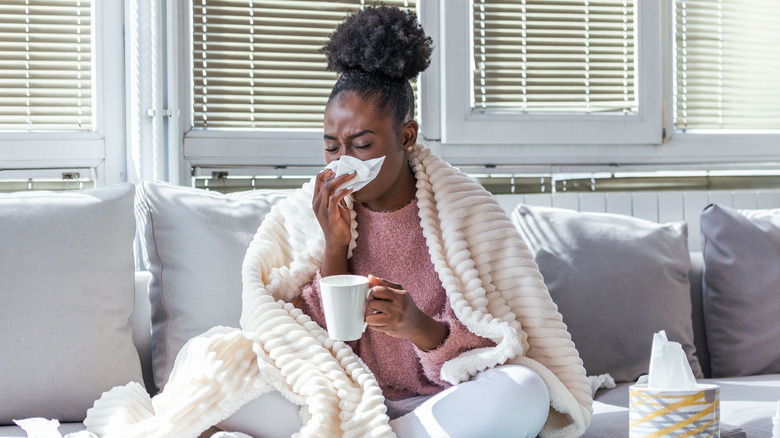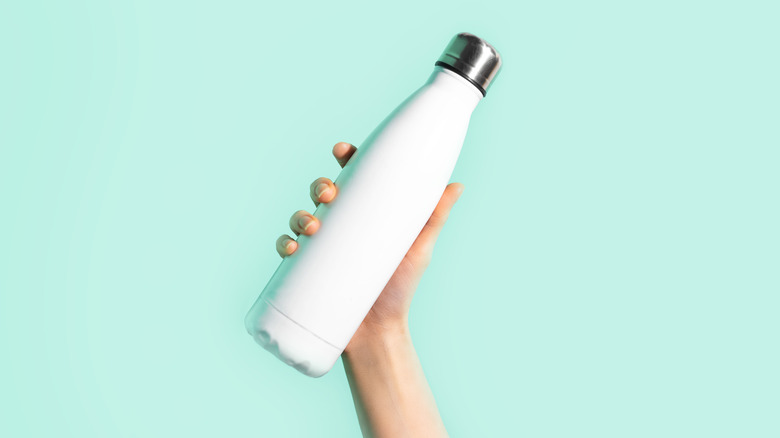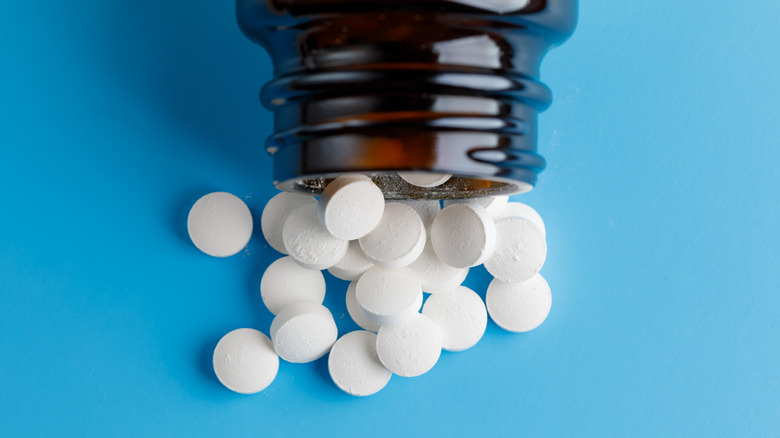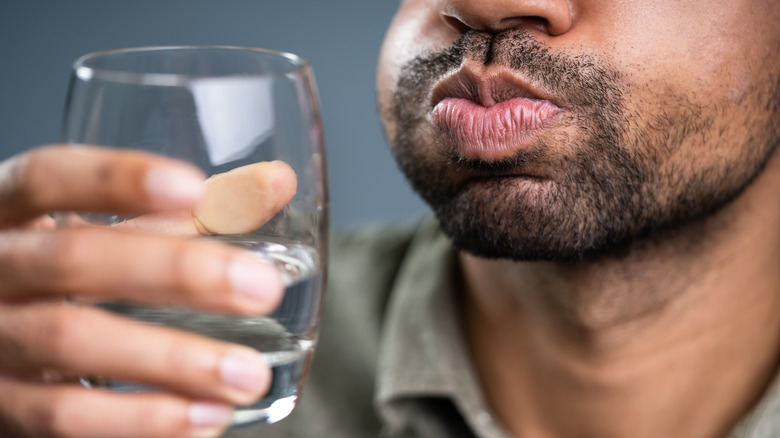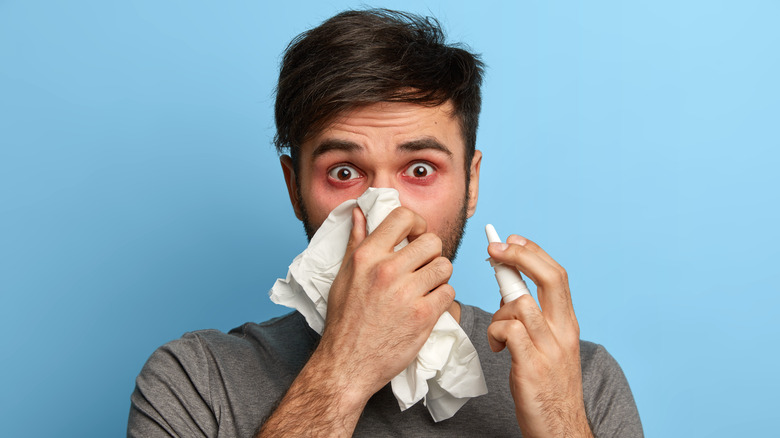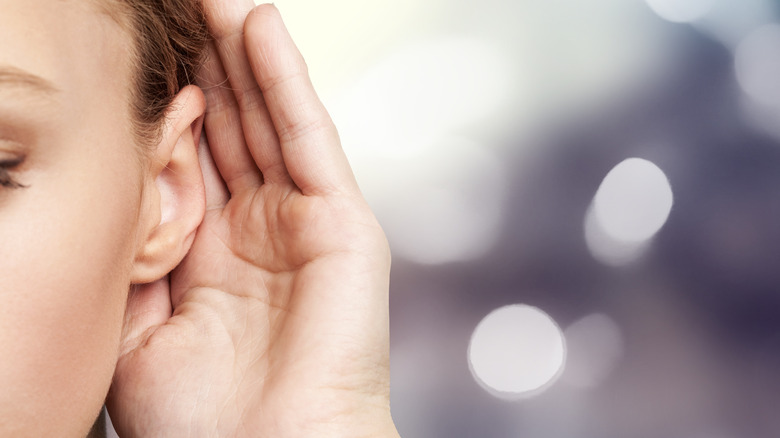What You Should Do If You Feel Like You're Getting A Cold
That tickle in your throat, a sense of being a little groggier than usual, a bit of a runny nose ... the warning signs of a cold are ones that we know all too well. The "common cold" is, as the name suggests, a pretty regular occurrence for most folks, with U.S. adults generally getting between two and four colds a year, and Americans experiencing approximately one billion colds between them annually (per WebMD).
Although colds can be largely harmless, all of these sniffles have a cumulative effect. According to a study published in the Journal of Occupational and Environmental Medicine, the common cold costs the U.S. economy around $25 billion dollars a year in lost productivity. And while you should absolutely prioritize your health and wellbeing when you're experiencing a cold, there are times where you might want to nip your sickness in the bud to carry on with your day-to-day life. And let's face it, no-one really wants to be ill with a cold. So here at Health Digest, we've put together some top tips on what you should do if you feel like you're coming down with a cold, to help you stay in fighting form.
What's happening to the body when you feel a cold coming on?
Have you ever sat with a box of tissues by your side, wondering exactly why you're feeling so rough? Well, let's shine a light on it. The common cold is caused by a virus (usually a rhinovirus, per Intermountain Healthcare) entering your body as a result of being in contact with an infected person or a surface contaminated by their germs, according to WebMD. When this virus enters your body, it attaches itself to your throat or nose lining, causing your immune system to respond by sending white blood cells to get rid of this alien presence attacking you.
If you don't have prior immunity to the specific virus in your system, however, your body has to react with more immune response, creating the symptoms of a cold (a runny nose and sneezing, a sore throat, watery eyes) that we all know so well. It's easy not to properly notice a cold until it's too late, but the early symptoms of a cold, usually a tingly throat, body aches, or tiredness, are the ones that we really need to watch out for to act fast, says Atlas MD's chief medical officer and family practice physician Doug Nunamaker to Healthline. According to Nunamaker, these crucial early days of a cold are when too few people react to their symptoms, which leads to a cold sticking with you longer and more severely.
Make sure you're getting enough rest
It can be very tempting to push through when we feel a cold coming on (after all, it's just a bit of a sniffle, right?), but doing the opposite and slowing down is one of the best things you can do in the early days of a cold cycle (via Everyday Health). When you become ill, sleep is one of the best things you can do to help your body fight against the illness, and extra sleep and rest is, therefore, a hugely important defense, says New York City-based infectious disease specialist Neelam Taneja-Uppal to Everyday Health. If your cold is accompanied by a fever, even if it's a low-grade one, it's especially important to get your head down.
What's more, adequate sleep is not only vital when you get a cold to help fight against it early on, but it's also important to help avoid cold infection in the first place. A study published in the (appropriately-titled!) medical journal Sleep found that people who had a shorter sleep duration — fewer than 6 hours per night — had a higher susceptibility to cold infection than those sleeping 8 hours or more regularly. There's never been a better excuse to take an extra hour in bed!
Drink plenty of fluids
Got a bottle of water handy? If you feel like you're getting a cold, you might want to grab one as you read this. Drinking enough fluids when you're coming down with something is one of the best things you can do to help your body fight a cold, states WebMD. When you're properly hydrated, it helps to thin out your mucus, the protective fluid substances produced by your body that helps to trap invaders and clear out irritants from your respiratory system (via MedicineNet). When your mucus is thinner, your sinuses drain better, helping to keep your body in better shape.
As WebMD says, the majority of liquids will help with this, as well as liquid-based foods like soups. In fact, adequate hydration is pretty much one of the best things you can do to keep your immune system healthy generally, advises the UCI Susan Samueli Integrative Health Institute. Having an inadequate amount of water in our system means our bodies have a harder time transporting nutrients to our organs properly, which can stop us from having a strong immune response, as well as contributing to a host of other health issues (via Mayo Clinic).
Cool it on the exercise
Sweating out the illness might seem like a good idea when you're developing a cold, but don't be tempted to go too hard, as it can make you feel much worse. It's important to remember that colds can range from trifling to serious, and working out with a mild cold could be fine. However, "exercising too hard when you're sick can make it more difficult for your body to fight off the infection and it can take longer for you to get better," states Cedars-Sinai Kerlan-Jobe Institute's primary care sports medicine specialist Kenton Fibel to Women's Health. Not only this, but if you're really hitting the cardio when you're coming down with something, you can end up dehydrating yourself. This is bad news for your recovery because, as certified personal trainer Katie Kollath says to Women's Health, "you really want to make sure you stay hydrated when you're sick."
So how do you judge whether you're okay to exercise or not? Well, apart from listening to your body, it can be useful to follow the "neck rule." If your symptoms are isolated to areas above the neck, exercise should be fine, but if you have any below that, it's advisable to take a break from the workouts.
Cook up a batch of chicken soup
Ah, chicken soup. The long-standing symbol for all that is nutritious and wholesome, and a classic cold remedy. But is it actually that good for you when you're brewing a common cold? Turns out, it may well be. One area where chicken soup is particularly useful for combatting illness is in its potential effects on respiratory tract infection symptoms (via Healthline) – the sore throats, coughs, and runny noses you see when you've got a cold, according to a study published in Chest. The study proposed that a classic chicken soup could deliver mild anti-inflammatory effects which help to ease cold symptoms in the respiratory tract.
It's useful to point out, however, that this study was conducted in a laboratory and not on a living person, as study author and Larson professor of medicine at the University of Nebraska Medical Center Stephen Rennard stated to CNN. Therefore, more study is needed, says Rennard. Despite this, chicken soup is still an excellent choice for ailing souls. As the Academy of Nutrition and Dietetics spokeswoman and registered dietitian Kristen Smith says, "Chicken soup can offer a nutrient-dense food option when someone is struggling with a poor appetite. It can also help increase hydration during a time when this could be a challenge" (per CNN). As well as that ... it's delicious.
Buying a bag of oranges can help, but maybe not how you think
One of the first things a lot of people do when they're coming down with a cold is to stock up on oranges. It's understandable, given vitamin C's pervasive reputation as a cold remedy, and oranges being full of the stuff.
But while vitamin C, and the oranges it comes in, could well help you when you have a cold coming, it might be in a different way than you think. According to WebMD, findings have largely been inconsistent on whether vitamin C affects you that much or makes you feel much better when you're ill. However, a review of studies that looked at the effects of vitamin C on the common cold did find some benefit to ingesting the vitamin when you've been infected (via The Cochrane Database of Systemic Reviews). The review, which looked at 30 different trials, found that ingesting vitamin C when sick appeared to result in a "modest benefit" in reducing the length of symptoms. These benefits, however, required "relatively high" doses of the vitamin to appear –- so eating a few tangerines might not quite cut it.
Grab yourself some zinc supplements
There are a million and one supplements out there that'll promise you lightning-fast recovery from illness, and it's easy to just grab all of them when you're ill. This is something that marketing folks know all too well –- there's a reason why the global dietary supplements market is projected to reach $272.4 billion in worth by 2028 (per Grand View Research).
But if you're looking for one that actually works, reaching for a zinc supplement is a great place to start –- and specifically, taking it when you feel a cold coming on. A meta-analysis published in The Journal of Family Practice looked at the efficacy of zinc supplementation for those suffering from a common cold, with an emphasis on the timing of when people took it. The meta-analysis concluded that if you start to take zinc supplements within the first 24 hours of the onset of a cold, it can not only potentially reduce the length of your cold but also the severity of your symptoms. Zinc supplementation at a later stage of a cold is not seen to be as effective, however. Taking zinc regularly may also help to reduce the number of colds you get per year, as the meta-analysis discusses.
Put down that alcohol
Look, we understand. Having a cold is pretty miserable, and reaching for a beer or even a hot toddy, a classic cold remedy, is rather tempting. But there's a good argument to be made to avoid alcohol entirely when you're brewing a cold, particularly when you're in the first stages of one. Although hot toddies are renowned for their cold-fighting abilities, it's generally from the ingredients in them which aren't whiskey, such as lemon, honey, and ginger (via Medical News Today). Regrettably, there's no evidence that alcohol helps with cold symptoms.
In fact, there's far more evidence to suggest that alcohol is a bad idea when you have a cold. Alcohol has a dehydrating effect on the body, which can make your symptoms much worse, says WebMD, which also points out that alcohol can dampen the immune system and make it harder for your body to fight off a cold. Additionally, alcohol might also interact negatively with any cold medications you could be taking to relieve symptoms, which could spell trouble. In short, it's probably a good idea to wait until you're in the clear before you head to the bar.
Grab yourself some cold medication -- as long as you're resting too
When you've got a sore head and a throat like sandpaper, medication can be a helpful aid to get you back to health. Common over-the-counter drugs like Advil, Robitussin, or Claritin can provide your body with a variety of symptom-relieving benefits, according to Healthline, and medications can often combine active ingredients to great effect. As such, there's no reason to go it alone with a cold, because as infectious disease specialist Pritish K. Tosh told Buzzfeed, "when combined with good rest and fluid intake, over-the-counter medications can make you feel a lot better." It's important to remember, though, that we need more than just the medication to combat a cold. Tosh adds, "Medications can help ease your symptoms, but you still need the rest and fluids to actually recover." It's all too easy to knock back these meds and then carry on with your day, but if you don't give your body the circumstances it needs to get better, you'll be carrying around that cold for weeks.
Get gargling
Sometimes, the simplest remedies can be some of the best. The basic act of gargling water can be an easy way of both preventing a cold and reducing symptoms when you've got one on the way, according to a study published in the American Journal of Preventive Medicine. Per their findings, gargling simple water three times a day — which can help clean pathogens from the throat — could be a cost-free method of cold management.
And if you really want to spice things up, adding some salt to the water you gargle could make it even more effective. As Sorana Segal-Maurer, chief of New York Hospital Queens' Dr. James J. Rahal Jr. Division of Infectious Disease told WebMD, gargling warm salt water when you're sick works to create "a high-salt barrier and you're pulling out a lot of fluids from the tissues in the throat area, so you're washing the virus out." Essentially, the salt works as a magnet for these fluids, taking the virus with it, meaning that "it's good for symptomatic relief," as Segal-Maurer states. Remember, though, this salt doesn't act as an antiviral — it won't cure you, but it might make you feel better.
Break out your nasal spray
When that seasonal blocked nose rolls around once more, it's time to stock up on the nasal spray. Decongestant nasal sprays can offer useful relief to cold symptoms and can help to relieve early signs of a stuffy nose by helping to shrink the inflamed blood vessels in your sinuses that flare up when you get sick, according to the Cleveland Clinic. Quick and easy to get over-the-counter, just make sure you're using these sprays right. Point them toward the back of your nose while you're using them instead of at the septum, as this can cause damage. Vitally, you also don't want to use these sprays for too long when you're not feeling your best. As WebMD points out, using these sprays for more than 3-5 days can result in a "rebound" effect that leaves you even more congested than before. What's more, if your nasal passages are at all damaged, avoid using nasal sprays, as this can worsen cold symptoms, states doctor of pharmacy Jessica Kravchuck to the Cleveland Clinic.
Put down your cigarettes
There are many reasons why you should try to limit or give up smoking (via the Centers for Disease Control and Prevention), but if you needed even more convincing, smoking's a particular problem when you're developing a cold. Smoking will exacerbate any cold symptoms you have, because as infectious disease specialist Neelam Taneja-Uppal tells Everyday Health, "when you smoke, you're irritating and damaging your lungs." The irritation caused by smoking compounds the irritation to your lungs that occurs when you have a cold, which means your body has a double-whammy of damage to deal with.
It's also useful to avoid other people smoking around you when you're sick, as secondhand smoke can be just as irritating to your respiratory tract as having a cigarette of your own. Add to all this the fact that both smoking and being exposed to secondhand smoke hamper your immune system and make you more susceptible to catching colds in the first place (per Healthline), and it's clear why it could be time to give up the cigs.
Put yourself in a position where you're less stressed
Real talk, having a cold isn't exactly relaxing. We get that. But when you've got early symptoms of one, trying to relieve stress as much as possible could be one of the best things you do for your recovery, as stress can have a powerful effect on your immune system (per the American Psychological Association). This is shown clearly in a wide-ranging meta-analysis, published in the Psychological Bulletin Journal in 2004, of more than 300 empirical articles. The meta-analysis found that stressful periods of anything from a few days to much longer periods of months or years can all reduce immunity, leaving us way more susceptible to more severe illness.
Not only does this mean that it can take longer for you to recover when you're ill, but also that you're likely to get colds more frequently if stress is a common feature in your life, states Verywell Mind. If you feel that stress is affecting your physical health, discussing your options with a doctor is a wise move.
Listen to your body
We've all tried to power through when we're ill. But perhaps the most important thing you can do if you feel like you're getting a cold is to key into what your body's trying to tell you, ie. to slow down. "When you are sick, the most important thing to do is listen to your own body," states Catherine Liu, the University of California's associate professor of clinical medicine in the division of infectious diseases, to Everyday Health. It'll likely be telling you what you need to know, whether that's to get more rest or to skip the gym.
Listening to your body, and acknowledging that you're ill, not only has positive effects for you and your hastened recovery, but for the people around you. "You're exposing others to your illness if you go to work or the gym when you're sick," says Tina Q. Tan, medical director of the International Patient Services Program at Ann & Robert H. Lurie Children's Hospital, to Real Simple. By taking the space you need to recover, you're also helping to keep other people safe and illness-free.



